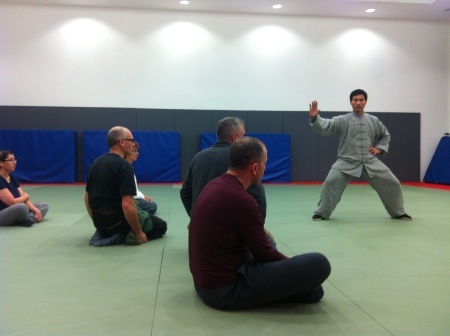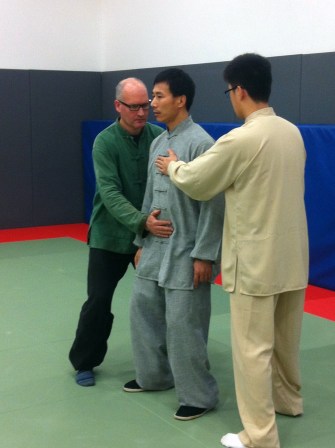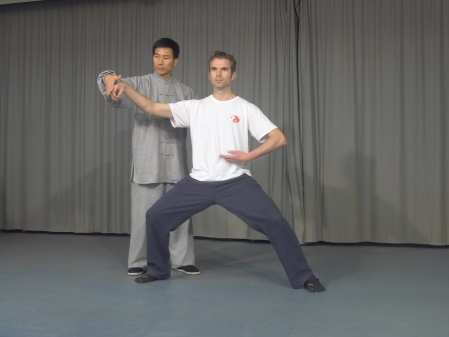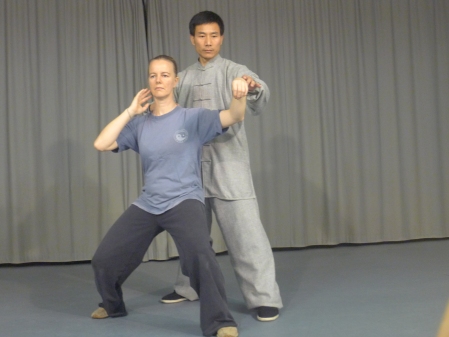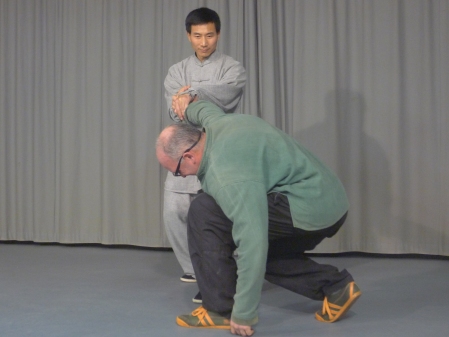“First, you have to find your body.” Calm and cool Chen Bing looks at each of us in turn. After patiently watching us carefully demonstrate the opening moves of our forms, this simple nugget of wisdom is the opening gambit of his corrections. Having picked him up from the airport the night before, this is our preliminary day of training with him on what will form his first ever visit to teach in the UK and the last leg of an extensive tour of America and Europe. “Only feel your body. Don’t think. Let your mind calm down. Find your body and keep this feeling.” he adds. This is easier said than done. It is very difficult to relax when you feel under pressure though this is perhaps the crux of our art. As we mull over these wise words Chen Bing decides to illustrate his point. “Watch me.” he says and casually demonstrates a slick freestyle medley of moves from Laojia Yilu, the first form of Chen Taijiquan. As we watch, the observer becoming the observed, one thing is clear, the quality of his movement is exceptional, it simply oozes decades of dedicated training. Yet despite his combination of slow, fluid silk-reeling, unfaltering low stances, cat-like agility and crisp fajin it is actually his unwavering composure, a palpable focus and awareness, that most characterises his form. So in the cool of the early, misty December morning Phil, Emma and myself get back to work on refining our practise, readily inspired by Master Chen’s demonstration and the coming week of seminars we have organised together for him in Oxford and Chichester.
Over the last twenty years or so the Chen style of Taijiquan has become increasingly popular worldwide and not least of all in the UK. Regular visits from such luminaries as Chen Xiao Wang, and more recently his younger brother Chen Xiao Xing and nephew Chen Ziqiang, have done much to inspire people to take up Chen Taiji and challenge the notion that Taiji in general consists only of slow movements comprising a pursuit primarily reserved for the elderly. A coin, of course, has two sides and the Chen style’s emphasis on balancing Yin and Yang, hard and soft, fast and slow has perhaps helped to remedy this gross misconception and spark a wonderful growing interest in Taiji amongst younger people in recent years.
Nephew of Grandmasters Chen Xiao Wang and Chen Xiao Xing, Chen Bing was born in 1971 and started to train with his uncles at the age of six. As he matured in his teens he gradually became more conscious of and inspired by the impressive skills of his famous uncles, especially Chen Xiao Wang whom he says he has always looked up to. This, along with the growing feeling of responsibility of being the eldest of his generation, influenced him as a teenager to make the conscious decision to dedicate himself entirely to Taiji. From then on he became very focused on and dedicated to his training being much more careful, meticulous and rigorous in his adherence to Taiji principles than ever before. In the same vein as Chen Xiao Wang he says that he found he naturally favoured the focused, meditative practise of Zhanzhuang (standing meditation) and Chansigong (silk-reeling exercises) rather than the allure of the faster ‘Cannon Fist’ routine alone which the younger people in Chen village often fixate upon. This is perhaps where the more mindful flavour of his art comes from as well as going some way to explain the formidable power he has for someone of a more slight stature. During his time with us he would often say that if one desires speed and power then one must first calm the mind and develop slowness and softness. Decades of training later sees him as a widely respected, highly skilled practitioner, teacher and winner of many pushing hands competitions in China where his outstanding record of success has earned him the nickname ‘Taiji Almighty’ and certification as a ‘Chinese Intangible Cultural Asset to Taiji’. These days he is widely considered to be one of the best practitioners to ever come from Chen village and aside from his potent Taiji skills is well known and well liked across China for his humble, gentle nature and warm personality.
Over the last few years myself and my good friends, fellow Chen Taiji instructors Phil Muil and Emma Westlake who run the Oxford School of Tai Chi and Chi Kung (www.oxfordtaichi.co.uk) had been watching Chen Bing’s progress with keen interest. With many excellent videos of his forms and pushing hands on Youtube we were sure that soon enough he would come to teach in the UK especially seeing that he was spending more time in America and Europe each year. We waited with baited breath ever more enticed by glowing reports of his generous and warm teaching style from friends and students of ours who had travelled over to China to train with him at his school in Chenjiagou. As each year went by we told ourselves that surely someone would invite him over this year. Eventually enough was enough and early last year we decided to bite the bullet and sent Chen Bing a warm, formal invitation to join us in the UK to conduct a week of seminars joint hosted by our two Taiji schools. To our delight he accepted and we immediately busied ourselves making all the necessary arrangements for his arrival scheduled for early December 2013. Slowly but surely we put together a programme that would cover all the basics of Chen Taiji featuring Zhanzhuang and Chansigong, a few days to focus on the requisite Laojia Yilu form as well as the more lively Xinjia Yilu and of course an in-depth Tui-shou seminar, all of which we eagerly awaited. Time flew by and December soon came around with lots of lovely people from across the country coming to take part in the seminars. Taiji certainly brings friends together; a week or so before Chen Bing arrived we were contacted by one of his disciples from China, Yiheng Yu, who had only recently moved to England to attend Sussex University. Young Yiheng was delighted to be able to come and study with his Shifu in the UK and turned out to be an excellent translator. While Chen Bing speaks good English the explanation of some of the finer Taiji points really benefitted from some additional translation.
The main features that characterised Chen Bing’s training and teaching flowed like a strong current both clear and consistent throughout all of the seminars he conducted regardless of the theme. It was these distinct characteristics that we all found so useful and appealing that I would like to outline here.
Firstly, Chen Bing deeply emphasised using the felt senses of the body as the main tool to not only calm the mind but also concentrate and perceive accurately the process of one’s training in a very down to earth and no nonsense way. For him it seemed that relaxation and concentration should go hand in hand and that these two inseparable components were required in order that we might first, and most importantly, ‘find our body’ and then develop through training what he called a ‘Taiji body’ thus allowing balanced Taiji movement to occur whether it be fast or slow, hard or soft. In order to ‘find the body’ as he put it, we must learn to entirely relax and focus on our body in what we are doing and not be distracted by our thoughts. This way, one can first discover and then develop their root and centre (dantien) and over a long period of time, be able to slowly come to maintain central equilibrium at all times. We should do this, he suggested, through the constant practise of basics such as standing meditation and silk-reeling exercises, these being the necessary tools to really learn how to feel and relax the body and develop an accurate, visceral map of one’s own physicality and the problems and restrictions therein to solved. Staying balanced and relaxed, he urged, comprise not only the essential underlying preliminary requirements for all subsequent, more overtly martial, Taiji training but are also inseparable from health and happiness in day to day life. On the same note he said that learning how to pay attention and be aware of one’s posture and movement at all times in general everyday life would also play a large part in improving one’s Taiji.
Each seminar began with an extensive selection of warm-ups which ranged from being easy to fairly rigorous. The ‘Fansong’ exercises, as he calls them, are designed to systematically open all of the joints and soft-tissues. They combine relaxing soft bounces through the legs and hips, swinging motions and more integrative stretches that target all sections of the spine, some of which are often difficult for most of us to reach. I really liked the way that all of the warm-ups emphasised the use of gravity to provide a constant impetus to relax and move without unnecessary effort which allowed one to feel the inherent, elastic natural support of the body structure. Some of the exercises I found a little curious to begin with (that’s what learning is all about) but after a few days of practise soon felt the benefit of increased mobility and support especially in my hips and spine and thus warmed to them immensely.
During the Laojia and Xinjia form seminars we focused very thoroughly on all the essential basics that almost everyone who practices Taiji tends to eventually forgo or gloss over in favour of some other alluring tidbit. Having said that, we would from time to time cover a selection of really cool Fajin variations or combine some freestyle movements from the form just to keep everyone on their toes and mix things up a bit! On the whole however, Chen Bing emphasised that we should practise every movement of the form very slowly and mindfully. This way, he said, we could really learn how to feel, find, and thus train the body to relax and move without deviating from Taiji principles. When training us, at every junction in the form, he would get us to pause and feel, check our postures and relax our bodies from the inside out. He constantly urged us to relax, to feel our bodies heavy and loose without collapsing or compromising structural integrity or balance. This is easier said than done. Practising so slowly and thoroughly was very insightful and very good for the legs! The frequent soft ‘bobbing’ into one’s stance that he espoused to help soften the hips, shoulders and arms soon allowed new levels of leg fatigue to come to light; I noticed after just a few days that my stances felt significantly better and my upper body much more relaxed.
When holding a posture in the form such as Single Whip he would often get us to simply drop our arms and let them fall unencumbered with a slap to our sides just so that we could feel just how much unwanted effort we used to hold them up. “Arms heavy, Dantien heavy, and root heavy,” he enthused, “heavy, heavy, heavy!” Needless to say, he got us to feel the weight of his arms on many occasions and they were indeed exceptionally heavy and loose regardless of whether he made a fist or some other shape with his hands and arms.
The Tui-shou seminar with Chen Bing was particularly enjoyable and insightful. Before the obligatory warm-ups he talked about how for Taiji training to be successful everything should be practised systematically and step by step. The proficiency of each step simply builds upon the quality and foundation of the previous step. Of course, he said, it is just natural that we all want to progress quickly but everything comes down to how well one actually embodies the basics and nowhere is this more evident than in pushing hands. Therefore, he asserted, if one cannot relax and maintain their centre in simple standing, silk-reeling and form training then how can one expect to do so in pushing hands? More importantly, he added, this is one of the most salient points in Taiji that everybody says that they understand but in reality do not.
So to start with we practised some very simple partner work with one person being active, the other passive. The active person was to slowly and steadily push the other’s chest trying to locate and push through their centre while the passive person simply seek to stay balanced and neutralise the push with his body alone. Chen Bing advised that the passive partner only focus on relaxing, sensing and maintaining their centre, just to experiment with it and not to try and think their way out of it. This would help us avoid relying on using our arms but instead instigate whole body movement using the centre to neutralize. When it came to practising with him the fluidity and stability of his body was very obvious and his centre virtually imperceptible.
Gradually we moved on to practise the main double-hand pattern typical of Chen Taiji. Again we followed the active and passive model from before but now it was trickier and required much more concentration. Over and over he would illustrate that by being passive and focusing only on following our partner and maintaining one’s centre it was much easier to discover and thus naturally exploit weaknesses in the active partner’s stability. Similarly, he iterated that fixed-step pushing hands is just a bridge to moving-step and moving-step pushing hands a bridge to free-fighting and as such suggested that we should avoid fixating on fixed-step training. He added that we should especially steer clear of the common mistakes of standing one’s ground and scoring a point at all costs as this would over time seriously compromise our long term Taiji skills.
Despite being surprisingly solid for his size I was very impressed how he always maintained a high level of softness and fluidity. Again he emphasised that we must avoid ‘hunkering down’ against a strong push and instead maintain our centre, flow around it and stay mobile. Even when training fixed step, he said, we must always retain the ability and willingness to step freely into a superior position when necessary otherwise we would literally become stuck in our ways and that would hinder us later on. Even when he would sink into an eye-wateringly low stance Chen Bing was very agile and light on his feet showing a great example of a moving root. This really came into play towards the end of the seminar when he started to demonstrate and teach some really tasty applications and takedowns all building upon the previous exercises but now employing some of the viciously deft footwork he talked about and emphasised during his form-work. It really was impressive how he combined all of these skills exceedingly well to form a very balanced approach overall: softness and sensitivity, strength and fluidity, stability and nimbleness. By the end of the seminar we were all dog-tired and very happy with lots of material to practise.
The week with Chen Bing flew by and we were very sorry to see him go. It was a great pleasure to co-host him with my excellent friends Phil and Emma whom I thank for all their hard work. Likewise it was excellent to meet the lovely Yiheng Yu now a firm friend and resident translator.
Chen Bing is a very pleasant man to be around. He exudes a calm, down-to-earth demeanour being both gently spoken and extremely easy going. Sometimes it is hard to imagine that he reset his own badly dislocated middle finger during a particular Tui-Shou match at the China National Championships only to go on to win that bout and then the next two in order to claim the gold medal. Although now after pushing hands with him it is much easier to bring to this mind! We can hardly wait until his next visit which we will be later this year. Until then, there is much practise to be done!






 发表于 2014-3-6 16:38:19
发表于 2014-3-6 16:38:19


